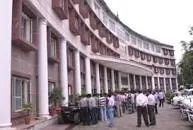Mapping reforms boon for start-ups, farmers: Modi

Will lead to Rs 1L cr geo-spatial eco: Harsh Vardhan
The Centre on Monday announced “sweeping changes” to the country’s mapping policy, specifically for Indian companies, to enable them to create substantial advances in mapping and ultimately empowering small businesses that “will lead to a one lakh crore rupees geo-spatial economy”.
Commenting on the mapping reforms, Prime Minister Narendra Modi said the reforms will unlock “tremendous opportunities” for our country’s start-ups.”
“India’s farmers will also be benefited by leveraging the potential of geo-spatial and remote sensing data. Democratising data will enable the rise of new technologies & platforms that will drive efficiencies in agriculture and allied sectors,” he said.
Union Science & Technology Minister Dr Harsh Vardhan held a joint Press conference with Union Minister for Space and Atomic Energy Jitendra Singh to unveil the mapping policy reforms.
“By liberalising the geo-spatial guidelines, the Government has taken a historic decision that will lead to a one lakh crore rupees geo-spatial economy. Today’s announcement heralds unlocking of geo-mapping from restrictive use to wider use in the interest of nation building and creating an Atmanirbhar Bharat,” said Singh.
Vardhan said, “The next generation of technologies will use hyper-resolution maps. Availability of comprehensive, highly accurate, granular and constantly updated representation of geospatial data will significantly benefit diverse sectors of the economy and will significantly boost innovation in the country and greatly enhance the preparedness of the country for emergency response.”
The availability of data and modern mapping technologies to Indian companies is also crucial for achieving the vision of Atmanirbhar Bharat and a five trillion-dollar economy, he said.
“With the advent of publicly available geospatial services, a lot of geospatial data that used to be in the restricted zone are freely and commonly available now and some of the policies/guidelines that used to regulate such information have been rendered obsolete and redundant,” said Vardhan.
“What is readily available globally does not need to be regulated. For Indian entities, there would be complete deregulation with no prior approvals, security clearances, licences, etc, for acquisition and production of geospatial data and geospatial data services including maps,” he announced.
Vardhan pointed out that all geospatial data produced using public funds, except classified geospatial data collected by security/law enforcement agencies, will be made accessible for scientific, economic and developmental purposes to all Indian Entities and without any restrictions on their use.
Government agencies and others need to collaborate and work towards openlinked geospatial data.
“Stakeholders benefitted will include practically every segment of society, from industry to academia to government departments,” he emphasised.
This is a transformative reform, the Minister added.
Speaking on the occasion, Singh said the Centre has taken a historic decision to completely deregulate Geospatial Map-making and unshackle the Geospatial sector in India for the first time.
He said the decision is an extension of a series of visionary reforms undertaken in the space sector. He pointed out that today’s announcement heralds the unlocking of geo-mapping from restrictive use to wider use in the interest of nation-building and creating an AtmaNirbhar Bharat.
Singh said this is one more distinct example of the removal of some of the colonial legacies that India was still grappling with.
He claimed that deregulation of Map-making is historic in the sense that Geo-Map is now going to be recognised as an instrument for development rather than only a tool for securing the country.
Singh also invited Indian businesses to take lead and utilise the opportunities being thrown open for the making of Atmanirbhar Bharat.
He said the collaborative efforts from industry, academia and the Government will make India a world leader in geospatial knowledge. The Minister urged all sections to grab the opportunity and fulfil the aspirations of the nation to become a five trillion-dollar economy.
Secretary, DST, Professor Ashutosh Sharma gave a presentation on the Geo-Spatial guidelines. He said the new guidelines will be “stimulating and empowering Indian industry and surveying agencies without diluting security concerns. Atmanirbharta in Geospatial products and solutions will be a one lakh crore business by 2030 plus economic impact through development”.
To realise India’s vision of Atmanirbhar Bharat and the goal of a 5 trillion-dollar economy, the regulations that apply to geospatial data and maps henceforth stand radically liberalised, according to the Government announcement.
Tuesday, 16 February 2021 | PNS | New Delhi





